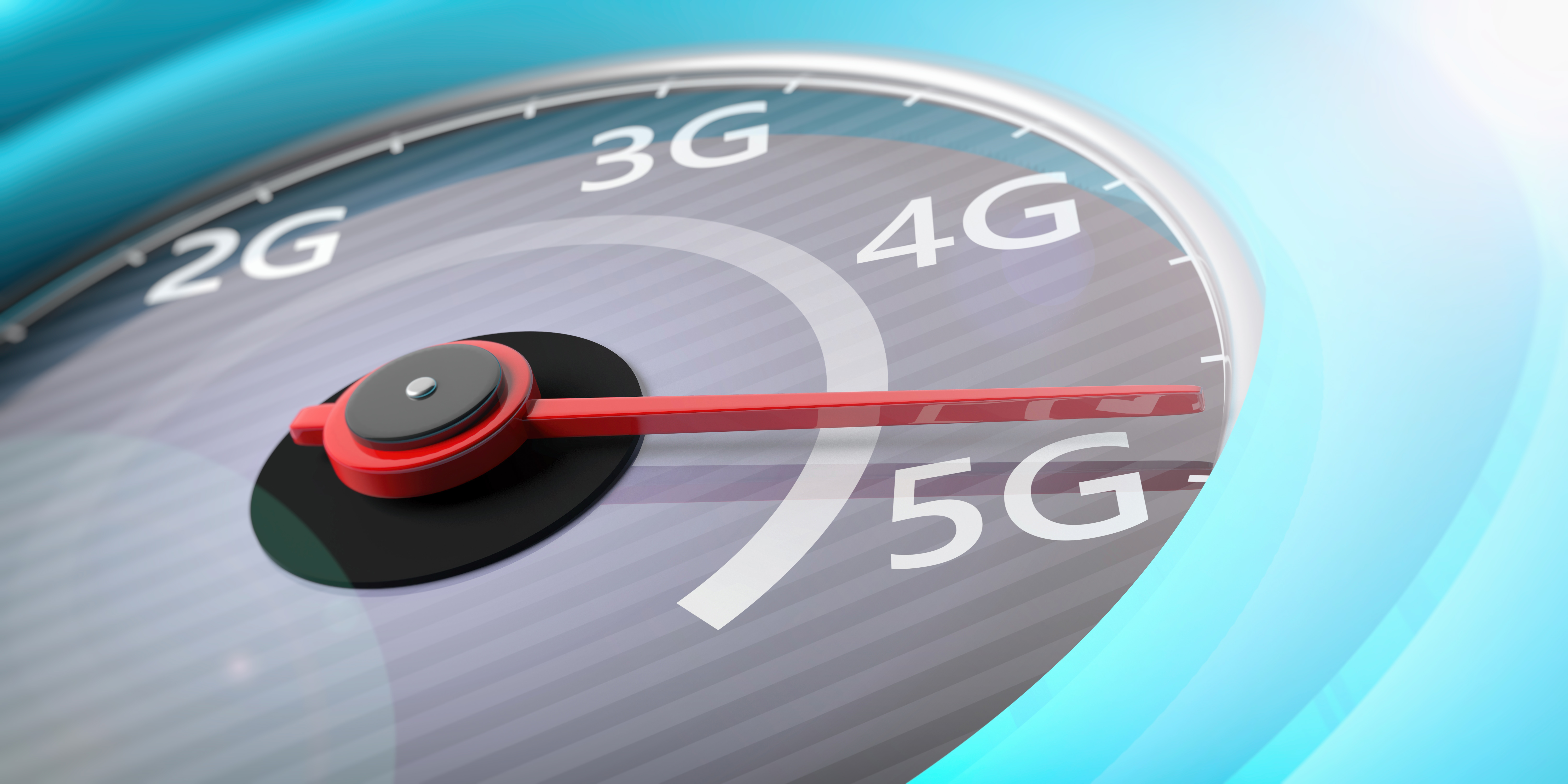
In March 2019, the Federal Network Agency started to auction off the 5G frequencies. Since then, the term 5G has been used more and more frequently. But what does it actually mean? What are the advantages of the new technology and why is it viewed critically by some?
In 2001, mobile phone users surfed the GSM network, that is to say the second-generation network (2G), at 0.01 Mbit/s. Now, the 5th generation of mobile communication networks is available, promising a speed of 10 Gbit/s. Nevertheless, network operators will continue to rely on LTE and will not reach the maximum speed of 5G. LTE is sufficient for private use, even with 4K streaming, although the possibilities are not yet completely exhausted. For the industry, however, 5G offers great advantages: With 5G, much more data can be transmitted in a much shorter time. To be precise, data transmission with 5G is 100 times as fast as with 4G/LTE.
Frequencies auctioned off among four providers in Germany
The auction of the 5G frequencies in Germany is not completed yet – which makes it the longest auction ever. Meanwhile, quotes have reached six billion Euros, while the expected price range had been three to five billion Euros. In the auction, mobile communication providers Telekom, Vodafone and Telefónica and, for the first time, newcomers 1&1 Drillisch are bidding for 5G frequencies. The existing spectrum below 1 gigahertz (GHz) has already been auctioned off; currently the range between 2.6 and 3.5 GHz is on offer if this capacity is required. In a last step, frequencies of 26 GHz and up will be provided at some point in the future. The waves are so short that they are hardly able to penetrate building walls. This is why they are not yet released for auction in Germany.
Conditions are attached to the purchase of the frequencies: By 2022, for example, providers must supply no less than 98% of all households with at least 100 Mbit/s and provide this speed on rail routes with more than 2,000 daily passengers, all motorways and the major federal roads. By 2024, this speed should be available for the remaining federal roads while state roads, seaports and other railway lines should be equipped with at least 50 Mbit/s.
5G for industry
But many industrial enterprises wish to benefit from 5G right away. These companies want to use the new technology in networked production, for working with augmented or virtual reality or to provide for real-time communication between machines. Although all of this is already possible with current technology, there will be lower latencies and smoother data and image transmission with 5G.
5G will allow factories to work without cable connections and to use mobile robots, and farmers will be able to evaluate high-resolution photos of plants immediately and take the appropriate measures directly. In the greenhouse, the data can be transmitted by fiber optic cables, but on a field in Brandenburg, farmers need 5G. Also autonomous vehicles will probably benefit from 5G thanks to real-time communication.
In spite of all these advantages, 55% of all German industrial enterprises feel that 5G is not yet relevant for them according to a Bitkom survey.
Use of 5G on an international level
The USA and South Korea have left Germany and the EU far behind when it comes to 5G expansion: While the auction for the frequencies has just started in Germany and the EU is discussing how to harmonize them, South Korea was the first country in the world to introduce 5G nation-wide in April. The US cities of Chicago and Minneapolis are now also connected to the 5G network.
Europe, on the contrary, presents mixed impressions. Finland and Estonia are already offering the first 5G mobile phone contracts. In the United Kingdom, the frequencies were auctioned off back in April 2018 but the introduction of 5G is scheduled for 2020 at the earliest. France has announced the provision of 5G for the first large city for this year. According to the Europe 5G Readiness Index Reports, Germany ranks 7th among 37 European countries while Finland, Sweden and Switzerland come in first.
5G as a health risk?
When you search for 5G on YouTube, the first thing you see will be horror scenarios and health warnings. This is because 5G needs new frequency ranges, more transmitters and more antennas. There are limit values which are oriented to the heating effect of radio waves – these are used, for example, with microwaves – but there is new research on athermal effects. These effects do not increase the temperature and are therefore below the limit value. However, they are said to be responsible for genetic defects, cancer and lack of concentration. Last September, 180 physicians from 36 countries called for a stop to 5G until final clarification of its effects on human health. The Federal Office for Radiation Protection criticizes the methodological weakness of the study, but would like to participate in a repeat study. The main problem is that the athermal effects can neither be proven nor excluded.
It is a fact that 5G will become reality pretty soon – above all in industry. Private individuals in Germany will not feel any effects for the time being, since current smartphone technology cannot accommodate 5G. However, smartphone manufacturers, among them Samsung and LG, announced the launch of 5G-capable smartphones on the market.
In summary:
- 5G is a fifth-generation mobile communications technology; in Germany it currently benefits primarily industrial enterprises.
- With 5G, data transmission is 100 times faster than with 4G/LTE.
- It is not yet clear whether the new technology affects human health.

